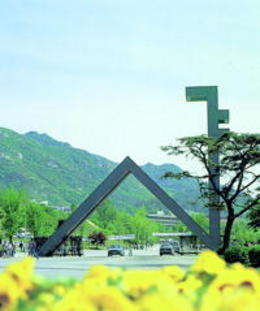 |
|
The main gate to the Seoul National University
|
Number of freshmen with doctors, lawyers for fathers continues to rise
Among freshmen at Seoul National University (SNU), the number whose father holds a high-paid job such as doctor, lawyer, judge, or senior executive at a major firm is increasing. In addition, the number of newcomers at South Korea’s most prestigious university that have fathers with graduate degrees rose 4.8 percentage points in four years, and the number of students that were privately tutored in high school jumped to 72.8 percent this year, compared with 28.3 percent in 1991. The figures are a result of an investigation by The Hankyoreh, based on Seoul National University’s annual survey on freshmen between 1991 and 2006. By fathers’ profession, the number of company executives and non-salary workers such as doctors and lawyers rose to 25.6 percent in 1995, from 22.7 percent in 1991. The system was reworked in 1996, but figures between 1996 and 2001 show an increase in a similar category from 49.6 percent to 52.8 percent. The system was again reworked in 2002, but an increase can still be charted for the category of high-paid fathers, rising from 38.7 percent in 2002 to 40.7 percent this year. Figures from the three categories cannot be compared with one another, but all show a general trend toward an increase in high-paid fathers for SNU freshmen. Meanwhile, the amount of students whose fathers are farmers or fishermen fell to 2.1 percent this year, compared with 9.7 percent in 1991.The number of students whose fathers hold an undergraduate or graduate degree rose to 76.5 percent this year, from 71.7 percent in 2002, when the survey of fathers’ academic backgrounds began. In comparison, according to a 2005 census by the National Statistical Office, 32.4 percent of South Korean males between 45 and 49 hold a university degree. The number of Seoul National University freshmen whose father holds a graduate degree stood at 27.1 percent, compared with the 4.7 percent national average for males aged 45 to 49. This year, 74.4 percent of the university’s newcomers came from major cities, compared with 65.5 percent in 1991. In contrast, the number of freshmen coming from rural and remote areas fell to 6 percent this year, from 9.6 percent in 1991. Kang Young Hae, a researcher at the Korea Educational Development Institute, said, "If parents have higher income and social status, there will be a higher possibility for better results in university enrollment. More freshmen with affluent backgrounds at Seoul National University reflects the economic polarization in our society."





